Summer Study: What Do Phase I Scholars Do?
This year, DO‑IT Phase I Scholars participated in a three-week, online Summer Study session. They learned about college life; explored online resources; interacted with peers, staff, and mentors; and had fun. The DO‑IT Scholars program started in 1993 as an experimental project for teens with disabilities nationwide. It is currently open to Washington State teens and is supported by the State of Washington.
The Medical and Social Models of Disability
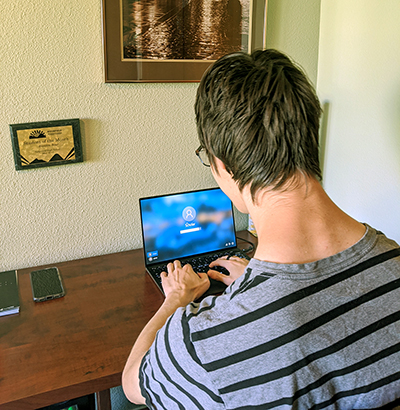
One of my favorite sessions during Summer Study was called “Nothing About Us Without Us! Disability Identity.” It was a super fascinating and engaging session that especially taught me about two different models of disability. You may be thinking, “Wait, there’s more than one?” Welcome to the same learning experience I had!
The presenter was Kayla Brown, a DO-IT staff member. She introduced us to the medical and the social model. The medical model, as she described, presented “disability is a ‘problem’ that exists within the person and the goal is to ‘fix’ the person.” This model has been used historically as the system of how to view people with disabilities, but it can perpetuate ableism and harmful ideas.
The social model on the other hand, “recognizes that disability and impairment are two separate things. A disabled person is a person with an impairment who experiences disability. Disability is a social construct created by barriers within institutions, attitudes, stereotypes, and inequality.” This model does not perpetuate the idea of “fixing” disability and promotes progress and accessibility from the beginning.
These two models are very important to me and the history of how we treat and view people with disabilities.
Deaf Accommodations
Deaf people can often struggle in society because of the lack of available resources. As a deaf person, I believe that we need to make some changes in our society in order to fully engage more people within our community. For example, captioning should be provided on all videos, including videos on FaceTime, Instagram, webinars, and lectures. Deaf people can often struggle in society because of the lack of available resources. As a deaf person, I believe that we need to make some changes in our society in order to fully engage more people within our community. For example, captioning should be provided on all videos, including videos on FaceTime, Instagram, webinars, and lectures. Providing captions on all videos can improve average watch time as “people are more likely to watch your video…[when] hav[ing] the option to turn captions on" (source). When videos do not provide captions, watch time can decrease as people lose interest or don’t watch the full video. English language learners and many others benefit from captions as well. These examples demonstrate the value of captions for everybody who wants to enjoy videos online. In the following paragraphs I share some of my personal recommendations to increase the engagement of deaf people.
Learning sign language in elementary school should become a nationwide requirement and not just in certain schools. Students at Dayton Consolidated Elementary in Maine “started learn[ing] sign language …[where] about a third of the kids now know enough [sign language] to navigate a kindergarten conversation” (source). The students didn’t do it for a specific curriculum but instead to make a classmate feel more welcome. These kindergarteners set a good example of how even young children can make a difference by learning sign language to make the classroom more diverse and inclusive for any type of disability. If even basic sign language was taught at a young age, more people would be able to share these communication skills widely and make a difference.
Personally, captioning really helps me with videos, especially in online meetings when people are talking over each other, and I often can’t read their lips. Without captions, I can be completely lost. If there aren’t any captions available, I will reach out to whoever created the video or coordinated a meeting.
Furthermore, we could create a more inclusive country if sign language was taught in elementary schools. An adult fluent in sign language could teach every grade as a weekly or monthly opportunity. If you want to promote this, reach out to school and district directors to make a specific recommendation and why it should be implemented.
ADA 30th Anniversary
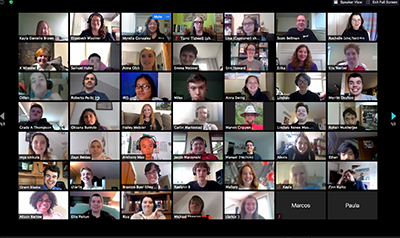
On Monday, July 27, 2020, we watched the 30th anniversary of the Americans with Disabilities Act (ADA). This law protects people with disabilities by allowing them the same access as others. The ADA has brought the disability community together.
The ADA has allowed more people with disabilities to work and engage in academic and other activities as well. It aims to remove barriers and eliminate discrimination and allow people with disabilities to complete degrees and to be hired and work effectively. The ADA requires that schools and companies provide reasonable accommodations to students and employees. For example, the ADA requires interpreters to provide access to those who are deaf. Being able to receive the accommodations I need is essential for me. Without the ADA, I would have struggled a lot in school.
At the 30th anniversary event we had a lot of fun listening to Governor Jay Inslee and learning cool things about the ADA and different disabilities. It was also a nice opportunity to celebrate with my fellow Scholars. We shared our thoughts and had a discussion about the ADA.
The Best Summer Study 2020 Classes
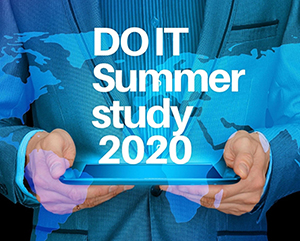
I learned a lot at Summer Study 2020. I especially appreciated learning how to do web development and graphic design. I also really enjoyed the Tech Talks and the workshop on interacting with faculty. I learned in the latter class that I should work on being more confident and assertive, as well as asking for accommodations I need in classes.
I want to thank all the staff and the Scholars for all the excellent teamwork and great communication. I hope next year we all get the opportunity to meet in person and learn even more.
Microsoft AI Technology
During Summer Study, Heather Dowdy, a senior program manager at the Artificial Intelligence (AI) for Accessibility Center in Microsoft, talked to us about Microsoft AI Technology and how it helps empower people with disabilities. She advised us to be brave, be curious, and be open-minded. She also shared how AI can be used in the environment, culture, human rights, and more.
During this online Summer Study session, I learned that Microsoft AI Technology is a framework for creating artificial intelligence solutions for data, sciences, machine learning, and more. Someday everyone could use it for tasks as varied as preparing for a job interview or as collective as protecting our environment. AI could potentially save our environment from pollution by analyzing better data models. I am considering studying environmental science in college. Engaging in this session may help me apply AI technology to solve environmental issues and help reduce speed of climate change.
Another thing that AI can be used for is in health fields. Healthcare is even more important now due to the COVID-19 pandemic. Maybe AI could help us find a cure for coronavirus and other infectious diseases. More advances in healthcare could increase our lifespan in the upcoming years. I am also interested in healthcare and how AI technology can be used to improve our lives.
Being Put on a Pedestal
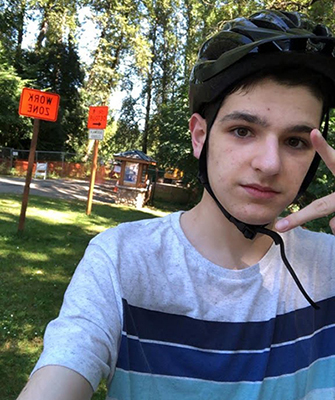
We as a society are on a journey to reaching equality and making progress every year. In some areas, we make slow or little progress, but at least that’s better than no progress at all. With regards to ableism, I believe we are far from making obvious progress, but the story is not over.
To me, ableism refers to actions that showcase rejecting people with disabilities, taking their struggles for granted, being glad you aren’t like them, and making distasteful comments and jokes about them. This is a very undertaught topic that I never learned in my history classes. I hope we can bring more awareness of people with disabilities’ needs and stop ableist representations of people with disabilities.
People tend to fixate on people with disabilities by seeing them as inspirational just for living their lives. While being inspirational is not generally seen as a negative, in this context it is often nondisabled people saying people with disabilities can’t live up to more. People with disabilities are not special for just having a disability; they are special for being themselves, developing expertise, and using their voices. People with disabilities want to be treated like everyone else, not like little kids. They are human beings with feelings who don’t deserve to be joked about, stereotyped, or called bad words targeting their disabilities. Words matter, as they affect feelings, emotions, and social norms. While it can be nice to offer help to someone with a disability, don’t take it as an opportunity to ask about their disability. People with disabilities also don’t want to feel pressured to constantly explain their stories and backgrounds. It is often stressful for people with disabilities when they have to repeatedly explain their disabilities just to receive reasonable accommodations.
People with disabilities appreciate the continued support of people in society. They often need help with developing advocacy skills to have equal opportunities. Though I will probably be very old when I notice significant progress in beating ableism, I hope in due time more people understand that people with disabilities are just normal people living on Earth and that disabilities are a social construct.
“Disability doesn’t make you exceptional, but questioning what you think you know about it does.” Stella Young (1982 – 2014)
Persevering to Success
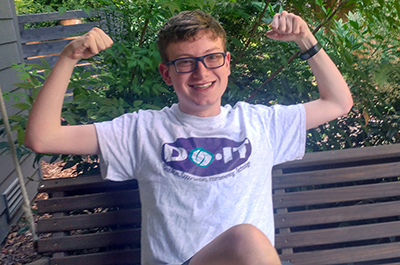
I was born with several congenital heart defects that required me to have several open-heart surgeries starting when I was just ten weeks old; while I have no further surgeries scheduled, it is still a constant thing on my mind. I also have been diagnosed with autism spectrum disorder. This means that my communication skills are not the best, and I have a hard time concentrating for long periods of time. Because of this, I take a course at my high school that provides me space and time to concentrate and work on assignments, projects, and tests for school.
I have been able to overcome my struggles several times and accomplish my goals and not let my disability take control of my life. In sixth grade, I won my school’s Brian Foote award, which is for persevering through tasks and overcoming difficulties. In eighth grade, I won the Kyle Keys award for outstanding courage. I have also been able to maintain a 3.83 GPA for high school, as well as be the news editor of my school’s newspaper, which has inspired me to be a journalist and has introduced me to many great friendships.
I have been able to overcome my difficulties throughout my entire life, as well as make many close friendships. My family is very supportive of me. I believe that many of my goals are within reach, and I will continue to persevere until I am able to reach them.
What Helps Dyslexic Students
Dyslexia is often categorized as a reading disability that affects the speed at which people are able to read or write. As someone who has dyslexia, I have many personal experiences with various tools and techniques designed to help those with dyslexia. In this article, I describe some tools that I have found to be the most helpful to me and perhaps other dyslexics as well.
Due to my dyslexia, I have an Individualized Education Plan (IEP), which provides me with accommodations at school. One accommodation provides me copies of the teacher’s PowerPoints and notes after a lecture. Since oftentimes dyslexics struggle to read and write, having the teacher’s notes allows me to pay attention to the lecture. I often have to memorize most information, so by getting the notes and paying attention fully to the lecture, I learn more efficiently.
Recently, I took a test at a college and they did not allow me to use notes on my final test, even though it was in my IEP. I scored less than 50 percent. When I contacted the school about my IEP and specific accommodations, they let me retake the test with notes, and I scored a 90 percent. I think that providing notes or outlines for all students is something that would help all students learn vocabulary and basic concepts much better.
Another way to support dyslexic students is to offer classes on how to use and troubleshoot interactive software. Although my phone has speech to text software, I always struggled to get my phone to type out what I was saying. By using speech to text software, it allows me and any other slow writer the ability to get our thoughts out. Through DO-IT, I was finally able to successfully use Dragon Speech. I felt comfortable trying out this technology since I knew that the DO‑IT program would provide me with support. Dragon Speech is not a cheap software, which can be daunting to spend if you don’t know if a program will work well for you. Providing classes on available tools and software, and the ability to test them out, could benefit all students.
Finally, an accommodation that really benefits me is extra time to complete work. With extra time I am able to read and process the information. I don’t need extra time because I have bad time management skills. Instead, I use my extra time to have people read and edit my document for grammar and punctuation. I find that although Dragon Speech is good, I can still use some assistance to make sure my message is clear and that takes time, which the IEP allows me to have.
Most of these strategies do not cost extra for the school or the student. If schools implemented these strategies for everyone, all students would be able to be successful. I am lucky that through my accommodations and my disability, I have the opportunity to gain extra support through these options.
Should Pit Bulls be Banned?
A topic close to my heart is whether pit bulls should be banned. I got to showcase my pit bull, who is gentle and cuddly, during pet night at Summer Study. A lot of people think that pit bulls should be banned because they’re supposedly vicious and have the ability to lock their jaw once they’ve bitten. Pit bulls are often portrayed as violent in the media. However, in my opinion, pit bulls are no more or less dangerous than any other dog breed.
Any dog can be dangerous if not raised or treated properly. Any medium or large dog can do significant damage. A pit bull could be dangerous, just as any dog could. Just as we are taught to not stereotype people, we shouldn’t stereotype dogs by their breed. We should treat each dog on their own merit and always be cautious when interacting with a dog you don’t know.
Jackbox Games with the Crew
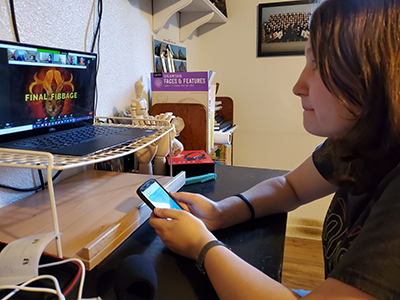
I really enjoyed playing Jackbox Games during game nights. These games support a large group, with most games playing eight players. The other Scholars make the game more exciting by being good pals to play with and refraining from any behavior that would dull the fun of playing games. My favorite game currently is “Fibbage” a game based of deception and trivia, with honorable mentions to “Trivia murder party” and “Brackeetering.”
During the gaming sessions, Phase I Scholar Braxton was one of the ones who got my attention with his wide knowledge and an ability to see past deception. Staff member Mira also was fun as she was able to trick me for a whole Fibbage game. I loved playing with all the Scholars; I can’t remember the last time I’ve had that much fun with a group of people I don’t know that well.
Scholar Favorites
Even though Summer Study was different this year than past years because of the pandemic, Scholars learned great skills, made connections, and had a blast. Audrey said the things she appreciated most this year was receiving her laptop and learning about college transition. While Anthony wished we could get together on campus, he was still happy to spend so much time getting to know new people. Iris enjoyed the makerspace tour where we learned about lots of engaging equipment available to UW students. We also had some fun evening and weekend social activities. Mallory’s favorites were the Jackbox games and movie nights. We watched How to Train Your Dragon and Finding Dory, and it was fun to chat about the positive themes of disability in both movies. Many Scholars were balancing jobs and helping out at home while attending Summer Study. Raelynn says she really experienced a lot while balancing starting college two years early with Summer Study. Michael sums it all up with a great quote “I signed up for DO-IT without knowing how much the program would mean to me—it is so much more than college prep. I will never regret joining!” 2020 Scholars stay connected by getting together online at least once a month. We are already looking forward to Summer Study 2021.